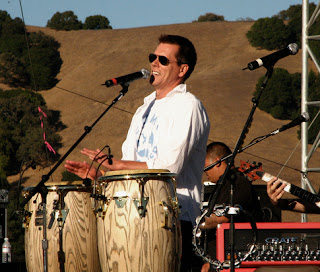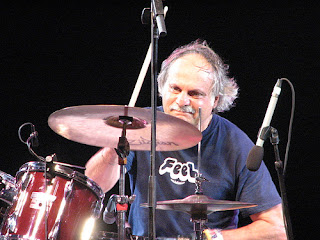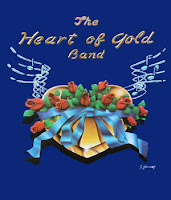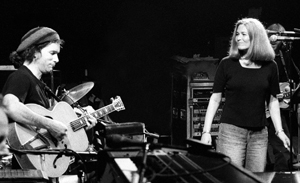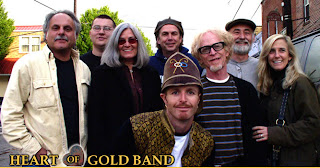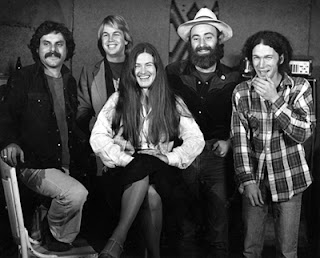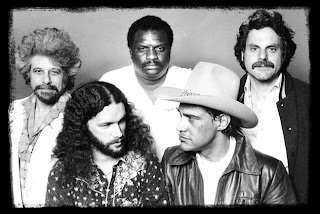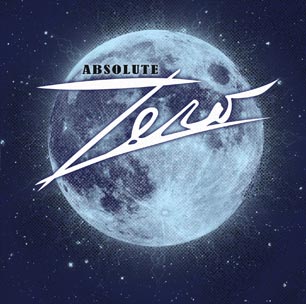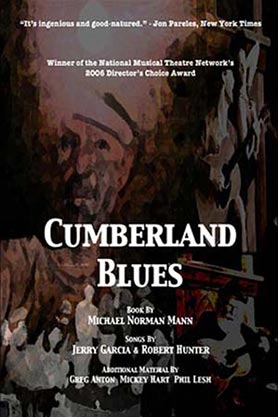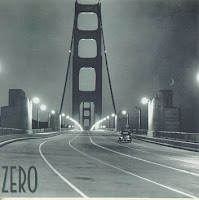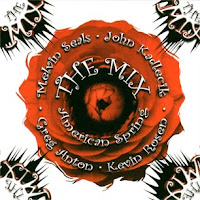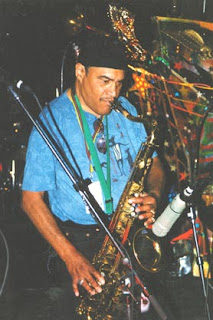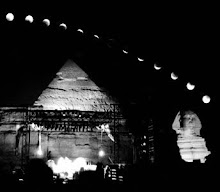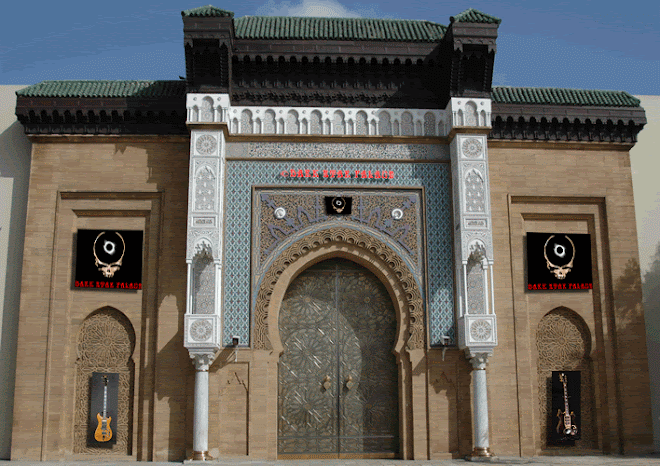This week at Dark Star Palace, in preparation for some highly anticipated Zero shows at the Great American Music Hall (on March 4th and 5th...get tix while you can!), we had the pleasure of sitting down and chatting with ace drummer and composer, Greg Anton. For Heads in the land of the Dead, you have probably crossed paths with Greg in more degrees than Kevin Bacon...wait, does that work? It does, it does! Read on...
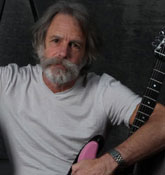 The obvious Anton-Dead connection lies with his performances, recordings and studio work over the years with Jerry Garcia, Bob Weir, Phil Lesh, Micky Hart, Robert Hunter... yeah, there's a thread here... Bill Kreutzmann, Keith Godchaux, Donna Godchaux, Vince Welnick... and the list goes on and on with other Dead-related greats like Melvin Seals, John Kahn, Steve Kimock, John Kadlecik, etc. He's a close songwriting partner with the rare and elusive poet-translator Robert Hunter, a founder of more bands than there are ice cream flavors (including Zero with Steve Kimock and the Heart of Gold Band with Keith and Donna Godchaux) and he's one of the rare drummers who understands why you can never leave your bassist alone in your car!
The obvious Anton-Dead connection lies with his performances, recordings and studio work over the years with Jerry Garcia, Bob Weir, Phil Lesh, Micky Hart, Robert Hunter... yeah, there's a thread here... Bill Kreutzmann, Keith Godchaux, Donna Godchaux, Vince Welnick... and the list goes on and on with other Dead-related greats like Melvin Seals, John Kahn, Steve Kimock, John Kadlecik, etc. He's a close songwriting partner with the rare and elusive poet-translator Robert Hunter, a founder of more bands than there are ice cream flavors (including Zero with Steve Kimock and the Heart of Gold Band with Keith and Donna Godchaux) and he's one of the rare drummers who understands why you can never leave your bassist alone in your car! For this week's Tape of the Week, we are going to be linking to a stream of Keith and Donna's last show with the Grateful Dead. Afterward, they hooked up with Greg and formed the Heart of Gold Band with him later that year. This 2/17/79 Dead show is a great one, and very bitter sweet for Heads who loved Keith and Donna's contributions to the Grateful Dead throughout the '70's. Enjoy! And now on to the main course...
DSP: Hey Greg! Thanks so much for joining Dark Star Palace to chat about your work, your history, and your relation with almost all the Grateful Dead related musicians that I can think of! I thought it would be fun to start our chat talking about your history with Keith and Donna Godchaux and the Heart of Gold band, and how that band started soon after Keith and Donna left the Grateful Dead...was it around 1980 when that kicked off? I think it was around then...but you know better than I!
GA: That’s not necessarily true regarding dates. But I want to say first that I really appreciate you doing this. I've always felt that it's people like you who support the music, promote it, put on shows, record it... It's an equal partnership with the musicians and it takes both of us to make it happen. As far as when I played with Keith and Donna, I think it was in the late 1800's (laughter).GA: I was playing in a band called the Ghosts, and we were in the studio, and Keith was hired to just play on the session. They started doing vocals and Keith said, "My wife sings..." And I said, "Bring her down...!" And he brought her down, and we hit it off...Donna and I and Keith just kept playing together. Donna is one of my dearest friends and one of the most wonderful people I've ever known.
DSP: Did they talk about leaving the Grateful Dead at that point? Were they down, or feeling elated about the new band? What was the vibe as this new band (the Heart of Gold band) coalesced?
GA: Actually, we didn’t talk much about the Grateful Dead. Donna had a few good stories and they always talked about Grateful Dead music in a positive way.
DSP: So that band wasn't together that long, because Keith's accident, right?
GA: We were doing studio stuff and rehearsing and trying to get it together. It was me and Keith and Donna, and for part of it John Kahn on bass. Then, somebody brought Steve Kimock to a session. Steve walked in the room with a Boogie amp in one hand and a guitar in the other hand and the sparks started flying! He and Keith had a magical musical connection. My jaw was droppin' watching those two guys play together.
DSP: Did you find your connection with Steve was immediate....was it like love at first sight musically?
GA: Actually, the kind of connection that you speak of is something that I look forward to developing in the future. (laughter). We're still working on it, but it’s getting there!
DSP: It gets sweeter with time! (laughter). So, the Heart of Gold band wasn't together that long because of Keith's accident, so after he passed away, was it Donna who said "I need time" or how was it that you and Steve formed Zero?
GA: It was a very emotional time, after Keith’s death. Me and Steve and Donna just kept playing. We got Mark Adler on keyboards and David McKay on bass and we kept on going with a similar repertoire.
DSP: So how did Zero come about?
GA: After a while, the players in The Heart of Gold band started drifting off in different musical directions. So, Steve and I went into the recording studio and recorded a bunch of instrumental stuff. We made this record, which by the way, is going to be released next month. The sessions were me on drums and piano and Steve played bass and guitar. It's a good record...I like it. There are about 19 guitar tracks on every song (laughter).GA: It's called "Absolute Zero". I am hoping it will be available at the upcoming shows on March 4th and 5th.
DSP: Let's talk about that. So you guys are putting the band back together (cue Blues Brothers track) and you're doing two shows only at the Great American Music Hall on March 4th and 5th, right?
GA: Yes, and we have one other show booked on May 14th in Oakland, which by the way, will have Bob Weir on rhythm guitar.DSP: Oh really! Bob Weir...an unknown Mill Valley guy!
GA: (laughter) Yeah, that will be for Wavy Gravy's 75th birthday party.
DSP: Wow, sounds like an amazing show. And it seems like it may not just be those 3 gigs....do you think this will lead into a tour, or what are you thinking right now?
GA: Hopefully. We'll see where it goes. It's kinda like dredging up an old Pirate ship from the bottom of the English Channel; we have to patch up a few holes and see if the thing still floats. (laughter) GA: (laughter) Yeah, that will be for Wavy Gravy's 75th birthday party.
DSP: Wow, sounds like an amazing show. And it seems like it may not just be those 3 gigs....do you think this will lead into a tour, or what are you thinking right now?
DSP: Well, I hope so! By the way, these are benefit shows right?
GA: Our singer, Judge Murphy, has had some health problems, so we’re trying to help him out spiritually and financially by doing these shows March 4th and 5th at the Music Hall.DSP: So, in looking at your history, you've played with all the members of the Grateful Dead and have played in a ton of different projects with various Grateful Dead related musicians. How is that you became a "Players Player" and ended up in the center of this Grateful Dead storm?
GA: I wouldn’t describe myself as being at the center of the Grateful Dead storm or at the center of the Grateful Dead anything. I’ve had an affinity for that kind of music since I was a kid. I came to San Francisco ‘cause I was attracted to the music that was coming out of the Bay area...dozens of bands that I was hearing, and yes, I always liked the Grateful Dead and admired them for the chances they took artistically. One thing led to another, I crossed paths with the guys in the Dead and ended doing some playing with all of them individually on different projects....although I never got a chance to play with Brent Midland. DSP: How did you originally connect with Robert Hunter.
GA: I’d played drums in a band with Robert Hunter and Keith and Donna, that’s how I met him. A some point later I ran into Hunter and he said to me "Zero can keep going on as an instrumental band, being admired by other musicians in the Bay area, or you can break out and maybe have some songs with lyrics." So I said, "Got any?" (laughter). And he said, "Got any music?" (laughter). And it just so happened that we had just finished our 3rd instrumental Zero record called "Nothing Goes Here" and I had a copy in my car. So I gave it to Hunter and he picked up on one of the songs and gave me some lyrics. And so I started working with him. The process was pretty much that I would go over to his house and play piano and he would have a pen and paper or a guitar and we would come up with a song. Then I would take that to Steve Kimock and he would usually add a chorus or a bridge, and that’s how most of the Zero/Hunter material came together.
DSP: And that led, and I may be wrong on this, to one of Hunter's longest songwriting partnership... besides Jerry Garcia. It spans Zero records, your band Greggs Eggs, Cast of Clowns material, songs you wrote with Hunter for John Lee Hooker, and stage productions like Cumberland Blues and Shakedown Street.
GA: Hunter is extremely prolific, seems like he’s always doing something interesting. He recently made a record with Bob Dylan. Right now I’m working with the Zero guys on a new song with Hunter lyrics about our late saxophonist Martin Fierro. So, we might have a new Hunter/Zero song at the Great American Music Hall!
DSP: Great! Wonderful!
GA: I’m excited about this Great American Music Hall thing. There are some guest players that are threatening to come down and we’re hoping this’ll be a special couple of nights. We’re putting a lot of work into preproduction and dusting off some old gems.
DSP: Will you guys be recording the shows?
GA: Yeah.
DSP: Great. I know a lot of Dark Star Palace readers are not from the Bay area, so it’s difficult for them to get to some of these shows. Recordings are a great way for them to check it out.GA: There’s a tight-knit family feeling and kind of a spirituality around these gigs that feels good ‘cause everyone’s coming together to support a brother.
DSP: That sounds great. Well, I know Zero is a big focus for you right now with the shows, the new record and potential tour. But, you also have some other projects going on as well, right?
GA: Another project I've been putting a lot of energy into these days is Cast of Clowns with Craig Wright. He's a singer-songwriter, but also a fiction writer. He's a great song writer, very literate. We’ve been playing all over the west coast and have some recordings coming out soon. The band is also with Melvin Seals and Jeff Pevar who is a phenomenal guitar player. Damian Urskine, a real bass virtuoso also joins in, as well as Robin Sylvester. (editor's note: Robin is the bass player from Ratdog. Bill Kreutzman, Barry Sless, and Hutch Hutcherson are also on the new Cast of Clowns record). DSP: Another project you were involved with was The Mix.
GA: That was fun. I think it was in 2003 or 2004 we toured on and off for a year or two and did about 40 shows or so. We mostly played around San Francisco and the West Coast but also played New York, around the Southwest, and Los Angeles. It was John Kadlecik (Furthur), Melvin Seals (Jerry Garcia Band), Kevin Rosen (Dark Star Orchestra), Jeff Pevar (Crosby, Stills and Nash) and myself.
DSP: Interesting tie-in there with John and Furthur. Are you planning any other projects with these guys?
GA: There’s a new album called "The Mix Live" that’s coming out in the next few months. It's a lively record, great guitar playing and original material by John Kadlecik, Melvin Seals and myself. There’s talk about us possibly getting together and doing more stuff in the future. DSP: So in looking at all these projects, it seems you wear a lot of hats: drummer, producer, songwriter....do you like changing things up like that?
GA: Well, Steve Kimock once told me that wearing hats causes baldness! (laughter).
DSP: You worked on some theater productions with Robert Hunter?
GA: There’s a playwright; Michael Mann. Several years ago he wrote some plays based on Robert Hunter lyrics.
DSP: I'm really surprised Hunter would actually be up for that.
GA: I don’t know much about Hunter’s relationship with Michael or how it came about, but I know that Hunter has very good taste when it comes to using his own lyrics in different applications, his standards are very high. When he said the play (Cumberland Blues) was cool, I took him at his word. I wrote a song with Hunter for the play called "I Will Love You." It's a very unusual Hunter lyric, a pure love song; very powerful. I went to opening night of the performance with Hunter and his wife Maureen and when the beautiful actress that played the lead role sang the the last verse, I practically fell out of my chair. (Editor’s Note: Here's the final verse of ‘I will Love You’, Hunter/Anton, Ice Nine Publishing)
"Through the moral situations
When both my hands are tied
And either way I waver seems
To be the losing side
Through the things I bring upon myself
And those that come for free
I will keep my faith in you
If you will keep your faith in me
I will love you
I will love you
I will
Love you"
And either way I waver seems
To be the losing side
Through the things I bring upon myself
And those that come for free
I will keep my faith in you
If you will keep your faith in me
I will love you
I will love you
I will
Love you"
The other songs in the play were written by Jerry Garcia and Phil Lesh with Hunter. I had a small part in it and was honored to be included.
DSP: Is it a lengthy process, writing a song with Robert Hunter?
GA: You know, some songs I've written with Hunter have taken a lot of re-writes. But with this song, we didn't change one word or one chord. It just kinda came together on its own accord, so to speak.
DSP: Wasn’t there a second play?
GA: Everyone had such a good time with that project that Michael Mann wrote another play called "Shakedown Street" which was based on other Grateful Dead songs. Hunter and I came up with 2 or 3 new songs for that one.
DSP: Alright, jumping topics, you are usually a solo drummer, but you’ve also done a lot of double drumming. I see a lot drummers do this: Billy and Mickey, Ringo and Jim Keltner, etc. How do you approach it?
GA: I really enjoy playing with other drummers. What happens is it feels like it becomes a third drummer that's running on it's own inertia. As a solo drummer you have to be on it, driving the thing all night long, but with two drummers you just kind of go along with the perpetual motion. It's more relaxing and can be great fun.
DSP: Who have you had fun doing it with?
GA: Prairie Prince, Mickey Hart, Greg Elmore....two of my favorite drummers to do this with have been Johnny Kimock and Bill Kreutzmann.
DSP: Interesting, do they have different styles of playing to you or are they similar? I think of Billy as being very "jazzy".
GA: I think of Billy as being very "snazzy"! (laughter)
DSP: Ha! Ok, let's talk about some of your favorite guys that you've played with. In terms of keyboard players you've played with, who jumps out?
GA: Well, it was such an honor to play with Nicky Hopkins. I played with him on a few different projects. He was one of the innovators of modern rock and roll piano playing. There were great blues and rock piano players before him but he took it to the next level.DSP: He seemed like a "sensitive" player... he almost played orchestrally...very delicate.
GA: He could pick up on a song faster than anyone I’ve ever played with. On that song "I Will Love You", I had comped the piano on the original demo, then Nicky came in and put a real piano track on it. I played him probably less that 20 seconds of it and he said "roll the tape." He played the song like he had played it his whole life. Other keyboard players that come to mind are Chip Roland, Peter Sears, Melvin Seals... these guys are world-class players. And of course, Keith Godchaux, an incredible musician. I occasionally play with a guy from New York, Geoff Menin, who manages to play a mixture of classical, jazz, and blues and makes it sound like rock and roll. Vince Welnick was also an amazing talent, and a great vocalist.DSP: Alright, bass players....?
GA: Bass players...the other night I had to break into my car after the gig because the bass player was locked inside. (laughter)
DSP: Ha! So who would jump out here, John Kahn?
GA: John Kahn was one of my favorites and probably the most unique. He had this acoustic upright jazz style of playing rock and roll on electric bass. He was a great musician. I got to play with him on several different projects. He played bass on some early Zero records, and I played drums on John’s solo record along with other members of the Garcia Band. Other great bass players that I’ve had the privilege of playing with: Liam Hanrahan, Bobby Vega, Robin Sylvester, Damian Urskine, Hutch Hutcherson, Rob Wasserman, Mario Cippolina. GA: I consider myself one of the luckiest guys in the world to play with someone as accomplished as Steve Kimock. His understanding of music symmetry is profound. Another brilliant player I've also been playing with lately is Jeff Pevar who can play a hundred songs a night and make them all sound unique. I'm playing this weekend with Stu Allen and Mark Karan who are total musicologists. Playing along with those guys playing and singing together is so much fun. I recently made a record with Stanley Jordan, with Paul McCandless on saxophone...those guys are melodic geniuses.
GA: I guess just about every rock band has at least one. Another guitar player I’ve had the honor of playing with is John Kadlecik. He obviously does an excellent job of interpreting Grateful Dead music. When I played with him, we did a variety of blues and rock and his overall knowledge of music is very deep, an extremely accomplished artist. His understanding of musical dynamics is wonderful... I think, for me, that’s what makes him such a joy to play with. And, of course, John Cippolina. He was like a Mark Twain of guitar playing; always unique; he had his own sound. You could hear one bar of him playing and know it was him. He was also was one of the most gentile, well-educated gentleman musicians I’ve ever encountered.
DSP: You know, I’ve never heard anything bad said about John.
 |
| John's sick guitar rig |
DSP: Ok...Saxophone players.
GA: Martin Fierro! Martin is the most unique individual I've ever encountered. He had a major impact on my life and pushed....forced... me to expand my experience of the envelope of perception.
DSP: That sounds heavy.
GA: I consider music to be the most pure form of expression, and Martin was pure music.
DSP: Tell me about him. What was he like off stage?
GA: The same as he was on stage. He was the same on the stage, in the studio, in the dressing room, in the hotel room, in the bathroom...and then he’d complete the full circle, Zero, he’d bring the bathroom to the stage. I shared so many experiences with Martin I don’t know where to begin. I traveled the country and played over a thousand gigs with the guy. He was a philosopher, medicine man, composer, decomposer, composter, prankster, doctor, nurse, patient....this sounds impossible, but sitting here, thinking about him, I can’t think of a word, any word; noun, verb, adjective.... that doesn’t in some way describe him.....in fact even those words...noun, verb, adjective, describe him.
DSP: Well, tell me one of your favorite experiences you shared with him?
GA: I was there when Martin delivered what I think was one of the greatest lines in Rock and Roll. Zero played a concert with Kenny G. and his band in Minneapolis and at one point Martin and I ended up in the dressing room with Kenny. I don’t remember who walked in last, but it ended up just the three of us in the dressing room with the door closed and I’m thinking how epic this is; these two saxophone players hanging out together, when Martin turns to me and says "Hey Greg, I think I'm going to change my name." And I say, "Oh really, what are you going to change your name to?" and Martin says: "Martin F.........G." He left just the right amount of pause between the F and the G....like Martin does when he plays a solo.
DSP: How did that go over?
GA: The conversation kind of deteriorated after that. I miss Martin dearly. He passed away a couple of years ago. I think about him almost every day.DSP: Well, I have to say it is an honor to talk with you Greg. I look forward to the upcoming shows at the Great American and also to sitting down and talking more with you down the line.
GA: It’s great to talk with you too! Thanks for supporting the music.(For more info on Greg and his various projects, check out: www.gregantonmusic.com)
Until next time at Dark Star Palace!!



